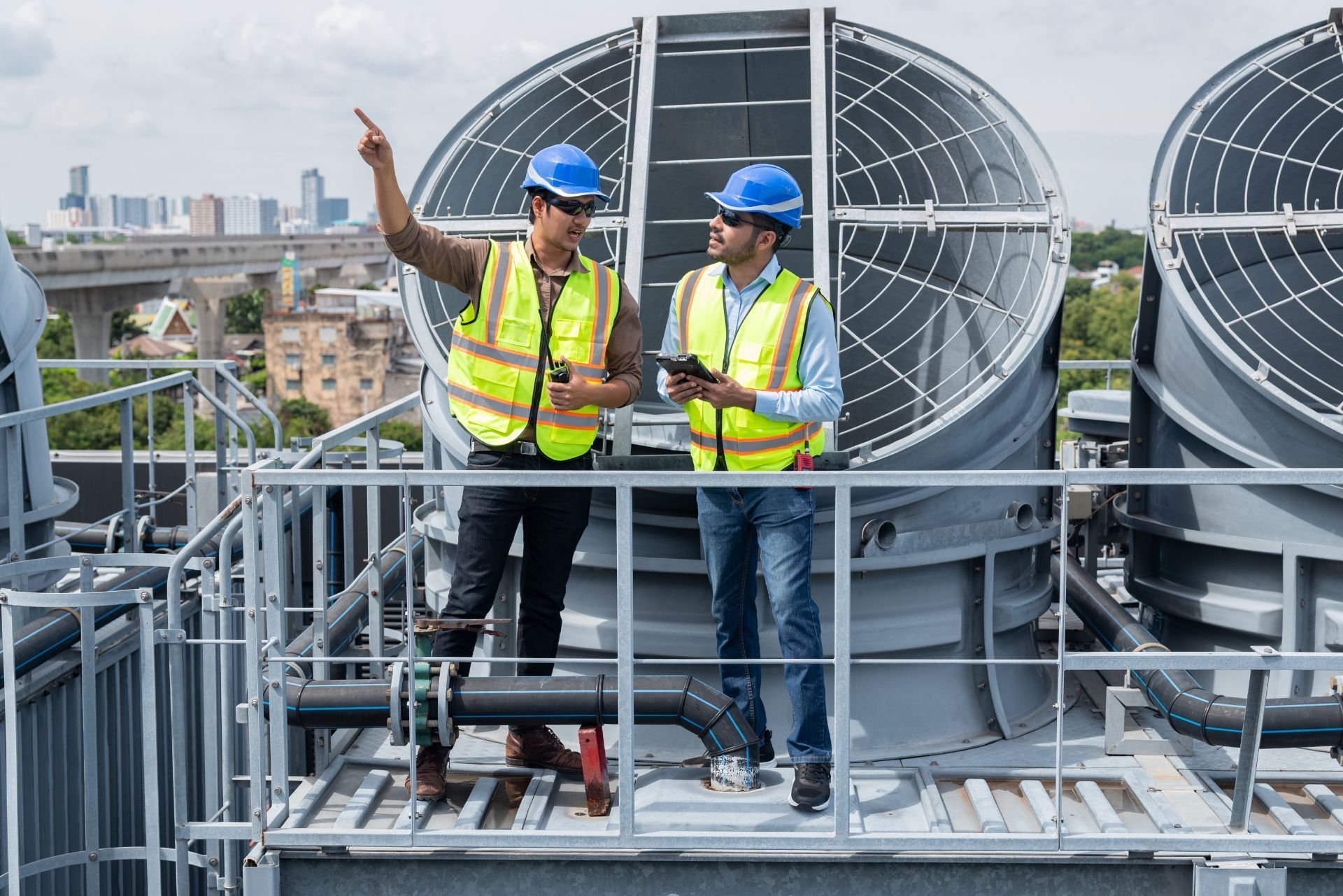Top 3 Recommended Policies

Vermont’s HVAC contractors face unique challenges as they keep homes and businesses comfortable through long, cold winters and short, humid summers. With heavy seasonal demand and evolving insurance requirements, having the right coverage is essential to protect your business from unexpected losses and liabilities. Proper insurance helps ensure compliance, safeguard employees, and build lasting trust with clients. This guide explains how HVAC contractor insurance in Vermont works, including the policies that matter most, current market trends, and factors that influence premium costs. As Vermont’s insurance industry continues to expand, especially within its well-known captive insurance sector, contractors have access to a range of specialized coverage options designed to meet their specific needs.
Understanding Workers’ Compensation Insurance in Vermont
Workers’ compensation insurance is a mandatory coverage for most HVAC contractors in Vermont. It protects employees who suffer work-related injuries or illnesses by covering medical expenses and lost wages. For contractors, it also limits liability by shielding the business from lawsuits related to workplace injuries.
One notable trend in Vermont is the significant decrease in workers’ compensation premiums over recent years. According to the Vermont Department of Financial Regulation, employers paid nearly 47% less in workers’ compensation premiums in 2023 compared to 2016. This reduction can ease the financial burden on HVAC contractors while maintaining essential protections for their workforce.
However, it’s important to note that Vermont’s workers’ compensation insurance rates remain among the highest in the nation, with typical costs around $5,850 per $100,000 payroll, as reported by ContractorNerd. This means HVAC contractors need to plan carefully to manage insurance expenses while ensuring compliance and adequate coverage.
Why Workers’ Compensation Matters for HVAC Contractors
HVAC work involves physical labor, use of heavy equipment, and exposure to electrical and environmental hazards. These factors increase the risk of workplace injuries, making workers’ compensation insurance vital. Without it, contractors risk costly legal claims and financial losses that could jeopardize their business.
Moreover, having workers’ compensation insurance can enhance a contractor’s reputation by demonstrating a commitment to employee safety and regulatory compliance. This can be a deciding factor for clients and subcontractors when choosing a service provider. In a competitive market, showcasing a robust safety program and insurance coverage can differentiate a contractor from others who may not prioritize these aspects, potentially leading to increased business opportunities.
Additionally, understanding the nuances of workers’ compensation can empower HVAC contractors to implement proactive safety measures. By investing in employee training programs and safety protocols, contractors can reduce the likelihood of accidents and injuries on the job. This not only fosters a safer work environment but can also lead to further reductions in insurance premiums over time, as insurers often reward businesses that demonstrate a commitment to risk management with lower rates. Furthermore, the implementation of safety measures can contribute to employee morale and retention, as workers feel valued and protected in their roles.

Liability Insurance: Protecting Your Business from Third-Party Claims
General liability insurance is another essential coverage for Vermont HVAC contractors. It protects against claims of bodily injury, property damage, or personal injury caused by business operations. For example, if a contractor accidentally damages a client’s property or someone is injured during a job, liability insurance covers legal fees and settlements.
Given Vermont’s increasing frequency of severe weather events, driven by a warmer and wetter climate as highlighted in a report from the Vermont Department of Financial Regulation, the potential for property damage claims may rise. HVAC contractors should ensure their liability coverage is robust enough to handle such risks, especially when working on properties vulnerable to weather-related damage.
Additional Liability Coverages to Consider
Beyond general liability, HVAC contractors might also consider professional liability insurance, which covers errors or omissions in service delivery, and product liability insurance if they install or sell HVAC equipment. These coverages provide further financial protection against specialized risks inherent in the HVAC industry.
Moreover, contractors should be aware of the importance of workers' compensation insurance, which is crucial for protecting employees in case of work-related injuries. In the HVAC field, where heavy lifting and exposure to hazardous materials are common, having this coverage not only safeguards the workforce but also ensures compliance with Vermont state laws. This type of insurance can cover medical expenses and lost wages, allowing employees to focus on recovery without the added stress of financial burdens.
Additionally, contractors might want to explore the benefits of umbrella insurance, which offers an extra layer of protection beyond the limits of their existing policies. This can be particularly valuable in the HVAC industry, where the costs associated with claims can escalate quickly due to the nature of the work and the potential for significant damages. By investing in comprehensive insurance solutions, HVAC contractors can not only protect their business assets but also enhance their credibility and trustworthiness in the eyes of clients, leading to increased opportunities and growth in a competitive market.
The Role of Captive Insurance in Vermont’s Market
Vermont has established itself as a leader in the captive insurance industry, a form of self-insurance where companies create their own licensed insurance subsidiaries to manage risk. In 2024 alone, Vermont licensed 41 new captive insurance companies, bringing the total to 683 active captives, according to the Vermont Department of Economic Development.
This growth places Vermont ahead of traditional captive insurance hubs like Bermuda and the Cayman Islands. For HVAC contractors and other businesses, captive insurance offers a tailored approach to managing risks and insurance costs, potentially providing more control and savings compared to traditional insurance markets.
Governor Phil Scott emphasized Vermont’s commitment to quality regulation and service in this sector, which benefits businesses seeking reliable and innovative insurance solutions. As the captive insurance industry thrives, HVAC contractors may find new opportunities to leverage these structures for their insurance needs.
The flexibility of captive insurance allows businesses to customize their coverage to fit their unique risk profiles, which is particularly advantageous in industries like HVAC where risks can vary significantly based on project types and geographic locations. For instance, an HVAC contractor operating in a region with extreme weather conditions may face different liabilities than one in a more temperate area. By utilizing captive insurance, these contractors can develop policies that specifically address their operational risks, potentially leading to lower premiums and more comprehensive coverage.
Moreover, the financial benefits of captive insurance extend beyond just cost savings. Captives can also serve as a strategic financial tool, allowing businesses to retain underwriting profits and invest them back into their operations. This can be particularly beneficial for HVAC contractors looking to expand their services or invest in new technologies. With the ability to manage their own claims and risk management processes, these companies can enhance their operational efficiency while also creating a safety net that supports long-term growth.

How Climate Change Impacts HVAC Contractor Insurance Needs
Vermont’s climate is becoming warmer and wetter, leading to more frequent and severe weather events that increase the risk of property damage. This trend, documented by the Vermont Department of Financial Regulation, has direct implications for HVAC contractors.
Contractors must be prepared for increased demand for HVAC system repairs and replacements following storms, floods, or other weather-related incidents. Insurance policies should be reviewed to ensure coverage for these heightened risks, including potential business interruption insurance to cover lost income during repair periods.
Additionally, contractors should consider investing in training and equipment that improve resilience and safety during extreme weather conditions, thereby reducing insurance claims and premiums over time.
Moreover, the changing climate is prompting a shift in the types of HVAC systems that are in demand. As temperatures rise, there is a growing need for energy-efficient cooling systems that can handle prolonged heat waves. Contractors who stay ahead of this trend by offering advanced, eco-friendly solutions not only meet customer needs but also position themselves favorably in the insurance landscape. Insurers may offer better rates to those who adopt sustainable technologies, recognizing their lower risk profiles in the face of climate-related challenges.
Furthermore, the implications of climate change extend beyond immediate repairs and replacements. HVAC contractors may find themselves navigating new regulations aimed at reducing carbon footprints and enhancing energy efficiency standards. Staying informed about these regulations is crucial, as non-compliance can lead to fines and increased liability risks. By proactively adapting to these changes, contractors can not only safeguard their operations but also enhance their reputation as responsible businesses committed to sustainability in an era of climate uncertainty.
Tips for Vermont HVAC Contractors When Choosing Insurance
Selecting the right insurance policies can be complex, but several key considerations can help Vermont HVAC contractors make sound decisions:
- Assess Your Risks: Understand the specific risks associated with your services, including workplace injuries, property damage, and environmental factors.
- Compare Premiums and Coverage: While Vermont’s workers’ compensation rates are high, the recent premium reductions indicate a positive trend. Shop around to find competitive rates without sacrificing coverage quality.
- Leverage Vermont’s Insurance Expertise: Take advantage of Vermont’s strong regulatory environment and growing captive insurance market, which may offer innovative solutions tailored to your needs.
- Consult with Insurance Professionals: Work with brokers or agents experienced in Vermont’s HVAC market to navigate complex policy options and ensure compliance.
These steps can help contractors secure comprehensive insurance that protects their business and supports long-term growth.
In addition to the aforementioned considerations, HVAC contractors should also pay attention to the specific types of coverage that are most relevant to their operations. For instance, general liability insurance is crucial for protecting against claims of bodily injury or property damage that may arise during the course of work. Furthermore, equipment breakdown insurance can be invaluable, given the high cost of repairing or replacing specialized HVAC equipment that is essential for daily operations. Understanding the nuances of these coverages can provide peace of mind and financial security.
Moreover, staying informed about changes in local laws and regulations is essential for Vermont HVAC contractors. The state may introduce new safety standards or environmental regulations that could impact insurance requirements. Regularly reviewing your insurance policy with a knowledgeable agent can ensure that your coverage remains adequate and compliant with any new legislation. This proactive approach not only safeguards your business but also enhances your reputation as a responsible contractor committed to maintaining high industry standards.
Conclusion: Staying Protected in Vermont’s Evolving Insurance Landscape
For HVAC contractors in Vermont, insurance is not just a regulatory requirement but a critical component of business sustainability. With Vermont’s rapidly growing captive insurance industry and the state’s proactive approach to regulation, contractors have access to a range of options to manage their risks effectively.
Understanding workers’ compensation, liability insurance, and the impacts of climate change on insurance needs is essential. By staying informed and working with knowledgeable professionals, Vermont HVAC contractors can navigate the complexities of insurance, reduce costs, and focus on delivering quality service to their customers.
For ongoing updates on Vermont’s insurance market and economic development, visit the
Vermont Department of Economic Development and the
Vermont Department of Financial Regulation.
Contact Us
HVACInsure is fully licensed and permitted to sell contractor and commercial insurance in Vermont.
We proudly serve clients throughout Vermont and maintain partnerships with local Vermont insurance carriers to ensure HVAC professionals receive compliant, affordable, and comprehensive coverage that meets project and regulatory requirements.
HVACInsure Focuses on Vermont HVAC Contractor Insurance
Burlington – South Burlington – Rutland – Barre – Montpelier – Winooski – St. Albans – Newport – Vergennes – Essex Junction – Bennington – Brattleboro – Milton – Hartford – Middlebury – Springfield – St. Johnsbury – Colchester – Williston – Shelburne – Swanton – Morristown – Lyndon – Northfield – Waterbury
Frequently Asked Question
Common HVAC Contractor Insurance Questions in Vermont
These FAQs address common contractor questions. As HVACInsure grows, we will update this section with real client experiences and answers.
How does Vermont's cold climate affect my HVAC insurance needs?
Vermont winters are long and cold. We cover heating system work, boilers, and the emergency repairs that extreme cold demands.
What coverage do I need for ski resort and tourism HVAC work?
Vermont's ski areas need reliable HVAC. We cover the quick-response requirements and seasonal demands of resort work.
Do I need special coverage for Vermont's energy efficiency focus?
Vermont leads on efficiency and weatherization. We cover heat pump installations and high-performance building work.
What about coverage for Vermont's historic and older buildings?
Vermont has many historic structures. We cover the liability of retrofitting HVAC in older buildings with preservation requirements.
How do Vermont's licensing requirements affect my insurance?
Vermont has specific requirements for fuel-burning equipment. We ensure your coverage meets state requirements.
Can I get coverage for work across Vermont's rural territory?
Absolutely. Vermont is rural with long travel times. We structure coverage that addresses the logistics of serving spread-out communities.

Still have questions?
Can’t find the answer you’re looking for? Please chat to our friendly team!

About The Author: James Jenkins
I’m James Jenkins, Founder and CEO of HVACInsure. I work with HVAC contractors and related trades to simplify insurance and make coverage easier to understand. Every day, I help business owners secure reliable protection, issue certificates quickly, and stay compliant so their teams can keep working safely and confidently.
Recognized by National HVAC Trade Associations
These trusted organizations set best practices and standards that carriers rely on when underwriting HVAC risks.
Membership signifies adherence to HVAC industry standards and contractor best practices.


